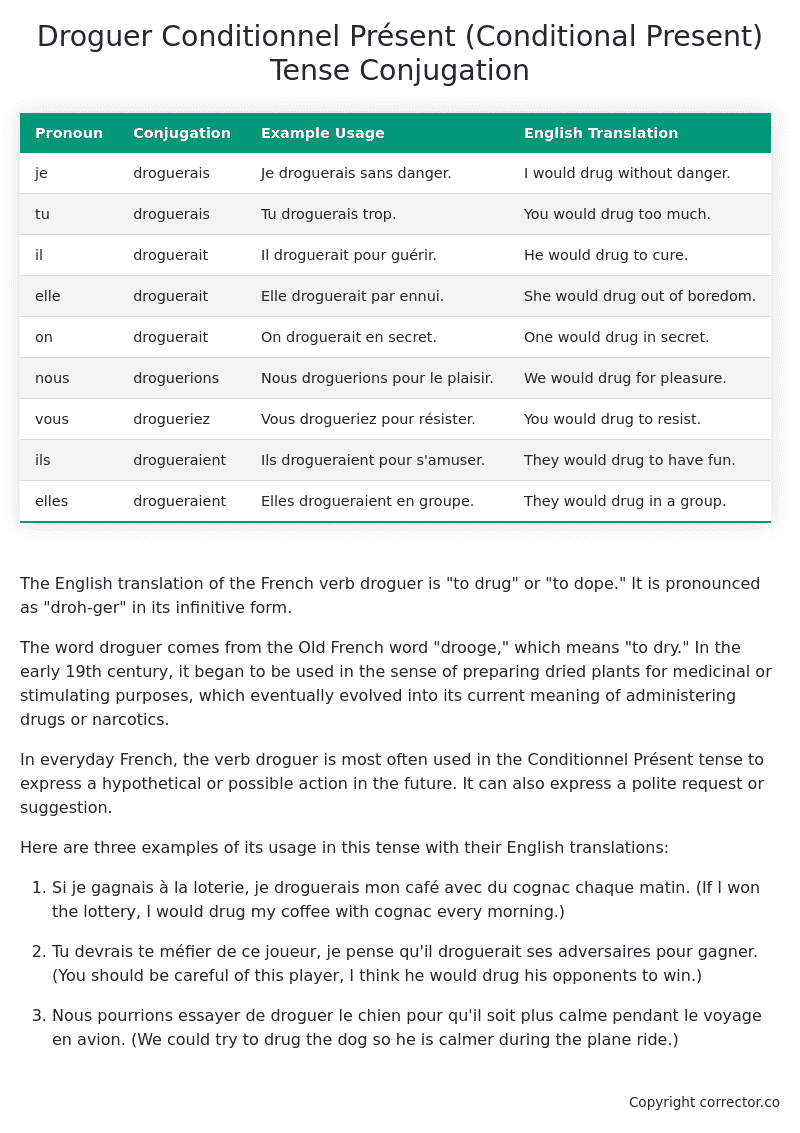Conditionnel Présent (Conditional Present) Tense Conjugation of the French Verb droguer
Introduction to the verb droguer
The English translation of the French verb droguer is “to drug” or “to dope.” It is pronounced as “droh-ger” in its infinitive form.
The word droguer comes from the Old French word “drooge,” which means “to dry.” In the early 19th century, it began to be used in the sense of preparing dried plants for medicinal or stimulating purposes, which eventually evolved into its current meaning of administering drugs or narcotics.
In everyday French, the verb droguer is most often used in the Conditionnel Présent tense to express a hypothetical or possible action in the future. It can also express a polite request or suggestion.
Here are three examples of its usage in this tense with their English translations:
-
Si je gagnais à la loterie, je droguerais mon café avec du cognac chaque matin. (If I won the lottery, I would drug my coffee with cognac every morning.)
-
Tu devrais te méfier de ce joueur, je pense qu’il droguerait ses adversaires pour gagner. (You should be careful of this player, I think he would drug his opponents to win.)
-
Nous pourrions essayer de droguer le chien pour qu’il soit plus calme pendant le voyage en avion. (We could try to drug the dog so he is calmer during the plane ride.)
Table of the Conditionnel Présent (Conditional Present) Tense Conjugation of droguer
| Pronoun | Conjugation | Example Usage | English Translation |
|---|---|---|---|
| je | droguerais | Je droguerais sans danger. | I would drug without danger. |
| tu | droguerais | Tu droguerais trop. | You would drug too much. |
| il | droguerait | Il droguerait pour guérir. | He would drug to cure. |
| elle | droguerait | Elle droguerait par ennui. | She would drug out of boredom. |
| on | droguerait | On droguerait en secret. | One would drug in secret. |
| nous | droguerions | Nous droguerions pour le plaisir. | We would drug for pleasure. |
| vous | drogueriez | Vous drogueriez pour résister. | You would drug to resist. |
| ils | drogueraient | Ils drogueraient pour s’amuser. | They would drug to have fun. |
| elles | drogueraient | Elles drogueraient en groupe. | They would drug in a group. |
Other Conjugations for Droguer.
Le Present (Present Tense) Conjugation of the French Verb droguer
Imparfait (Imperfect) Tense Conjugation of the French Verb droguer
Passé Simple (Simple Past) Tense Conjugation of the French Verb droguer
Passé Composé (Present Perfect) Tense Conjugation of the French Verb droguer
Futur Simple (Simple Future) Tense Conjugation of the French Verb droguer
Futur Proche (Near Future) Tense Conjugation of the French Verb droguer
Plus-que-parfait (Pluperfect) Tense Conjugation of the French Verb droguer
Passé Antérieur (Past Anterior) Tense Conjugation of the French Verb droguer
Futur Antérieur (Future Anterior) Tense Conjugation of the French Verb droguer
Subjonctif Présent (Subjunctive Present) Tense Conjugation of the French Verb droguer
Subjonctif Passé (Subjunctive Past) Tense Conjugation of the French Verb droguer
Subjonctif Imparfait (Subjunctive Imperfect) Tense Conjugation of the French Verb droguer
Subjonctif Plus-que-parfait (Subjunctive Pluperfect) Tense Conjugation of the French Verb droguer
Conditionnel Présent (Conditional Present) Tense Conjugation of the French Verb droguer (this article)
Conditionnel Passé (Conditional Past) Tense Conjugation of the French Verb droguer
L’impératif Présent (Imperative Present) Tense Conjugation of the French Verb droguer
L’infinitif Présent (Infinitive Present) Tense Conjugation of the French Verb droguer
Struggling with French verbs or the language in general? Why not use our free French Grammar Checker – no registration required!
Get a FREE Download Study Sheet of this Conjugation 🔥
Simply right click the image below, click “save image” and get your free reference for the droguer Conditionnel Présent tense conjugation!

Droguer – About the French Conditionnel Présent (Conditional Present) Tense
Formation
Common Everyday Usage Patterns
Expressing Polite Requests
Expressing Hypothetical Situations
Expressing Doubt or Uncertainty
Interactions with Other Tenses
Present Tense
Past Tense
Future Tense
Conditional Perfect
Summary
Want More?
I hope you enjoyed this article on the verb droguer. Still in a learning mood? Check out another TOTALLY random French verb conjugation!


